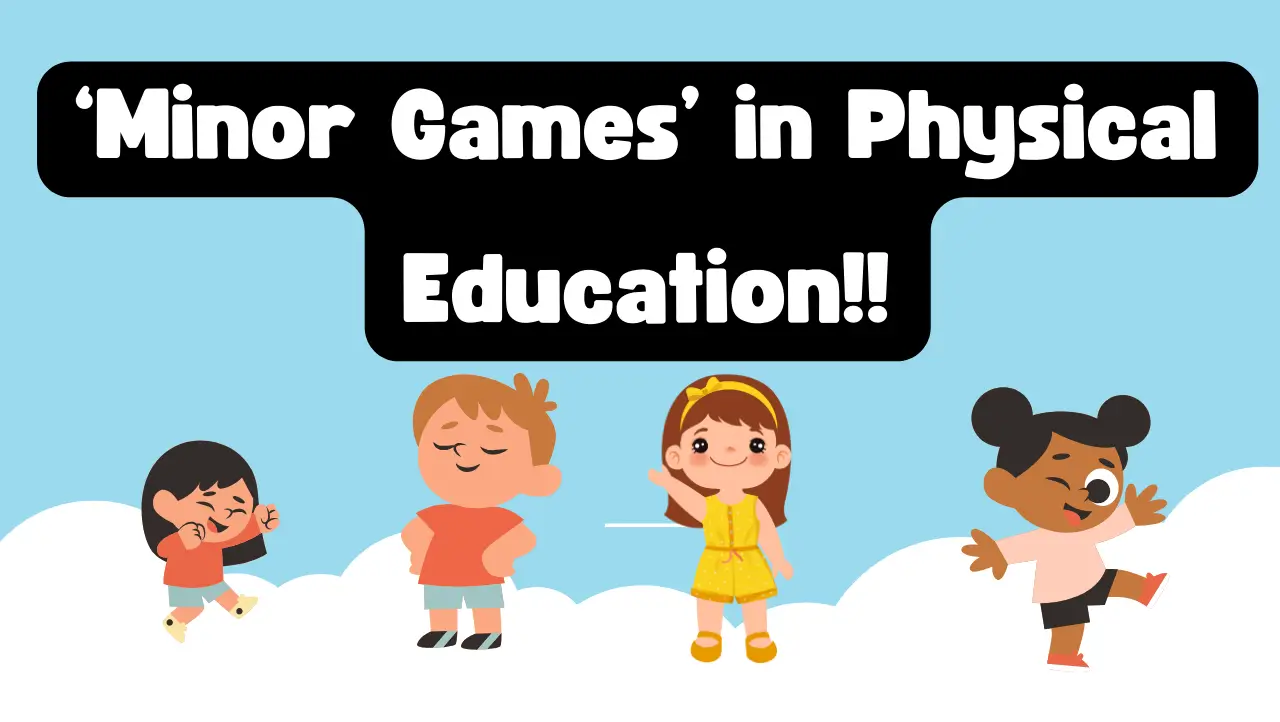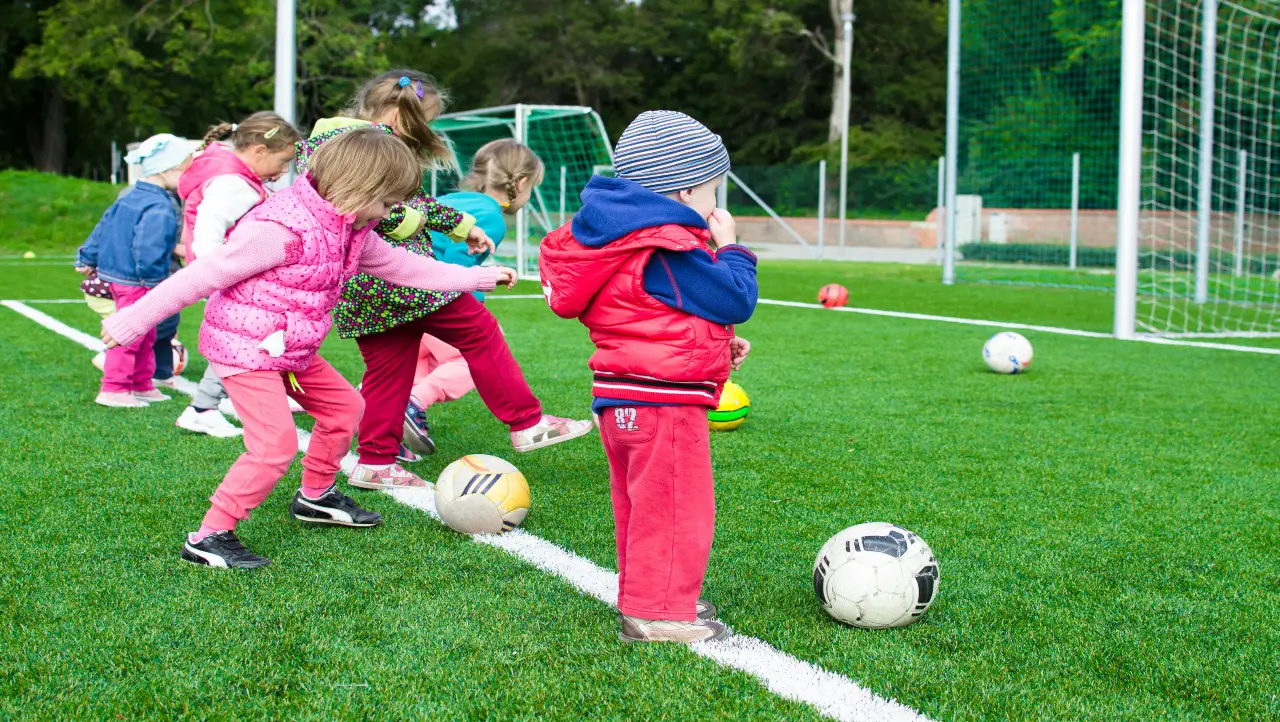What are Minor Games? | Primary Physical Education | Sport Lessons
Mar 20, 2024


Kas
Do you want to know what is one of the most overlooked and under-utilised categories of games in physical education? Yep, the title gives it away…Minor Games!
As defined by NSW Gov:
‘Minor games are simple games with few rules, designed to allow students to practice skills in a challenging situation’.
Minor games are important entry points for students to develop fundamental movement skills and generally sport competency prior to learning more complex sports and games.
Minor games allow students to break down typically larger and more complex games into manageable activities with achievable and focused skill development. This allows students to focus on specific components such as the fundamental movement skills and also aids teachers when they are trying to observe students for an assessment on a specific set of skills or focus areas.
Minor games are critical to ensure that students a simple clear starting point in order to understand more complex games and sports down the track. These minor games allow students to build a solid foundation of skills and understanding which will not only allow them to become competent in the game but also start to build confidence in their own ability. If a student starts playing a game such as basketball straight away with no prior knowledge on passing, dribbling, shooting and defending. They will get very overwhelmed, make a lot of mistakes and start to develop low self-efficacy in their ability to play that sport.
I use minor games generally at the start of all of my units of work, even for my high school students. They can serve as a great warm up or a tool to observe students current skills in a simple free flowing game that does not limit students by having a high barrier of entry to participate!
Here are some amazing ways you can use minor games in your lessons to create higher engagement, student success and add variety in what you are currently doing.
What Are Some Examples Of Minor Games?
The easiest way to describe minor games other than just ‘simple games’, is to think of them as games that are not major general sports like ‘Basketball, AFL, Netball, Soccer, Cricket). Minor games are activities that are generally done with Primary-age students to engage them in physical activity, serve as a warm-up to a more complex task or as an activity to help them develop a range of fundamental movement skills, technical skills and tactical understanding (at a basic level).
Below are examples of minor games:
- Rob the nest
- Two Ball Soccer
- Capture the flag
- Kick Ball
- Builders and Bulldozers
- Tag Games
- Number Soccer/netball/ basketball
Here is a link to more examples of great minor games- with lesson plans! link to a great site that has a range of Minor games

Why Are Minor Games Important?
Minor games are an important entry point when preparing students for more complex games. The limited rules and basic structure of the games, make it accessible for students of all abilities and provides a foundation for you the teacher to build on. Over time teachers can add more complexities to the game to challenge students and provide them with opportunities to deepen their understanding of the game and skills required to be successful.
Alternatively, when teachers introduce students to a very complex sport when it’s not developmentally appropriate to learn, students can become overwhelmed, display hesitation when it comes to participating in games, which will then start to diminish students self-belief in their ability during P.E lessons. This is not an outcome we want, we need to ensure students are challenged but are not constantly overreaching and not finding success.
Students need to be able to find success in each lesson to ensure they are engaged and having fun, this will build a desire to continue to learn in explore during games. Kids need to love P.E to thrive in P.E! We can do this but not throwing them into game situations where they don’t have the basics skills to not only play the game but understand what to do.
A great example of using a minor game as an entry point prior to more complex games (and one that I’m currently teaching) to my Year 3 and Year 4 students is the game category of ‘Invasion Games’. As we know this is a complex category of games, which includes sports such as basketball, soccer, netball and touch football. All very popular sports but with a high technical demand and complex rule systems.
How can one start to introduce students into this important category of sport, but meet them at a level that they are ready to participate at? ……With Minor Games !!
I’ve been using the minor game ‘Capture the Flag’ with students. A game where there are two teams, each trying to invade the other team’s area in order to collect a flag. Teams need to think of being defensive and offensive which is the foundation of essentially all invasion games. This minor game is not only enjoyable for the students, it also allows every student to be active and participate at the same time as this game does not have a central ball handler or one person dominating the action. Each player has a role and has the ability to attack or defend at any moment of the game. They need to make a decision based on what’s happening in the game as to what position they should be in that moment in time (Attacker or defender).
Once students start to become proficient at this game, I will make the rules more complex and continue to build on the rule sets until it becomes very close to a specific Invasion Game ‘Major Game’ like basketball. Through these minor games we can discuss the same tactical and technical skills that are required to be effective in our minor game which will then transfer over to when students are ready to undertake more complex Invasion games later in their schooling.
Another important thing about Minor games is that it allows you to isolate specific skills you are looking for when students are being assessed on their FMS. Using our previous example, if we are playing capture that flag our focus skills may be:
- Locomotor Skills: (Running, Leaping, Jumping, dodging)
- Stability Skills: (Turning, Balance, Stopping)
- Tactical Skills:
- Scanning the field of play (Defence)
- Looking for gaps in the field (Offence)

These are just examples of what you could do- typically a unit would only focus on a few technical and tactical skills, these would be the skills you would discuss with your students and assess them on. Students will be able to display these skills all at once in a game of capture the flag. Allowing them to implement and practise all of the discussed skills incorporating in an appropriate context of a game rather than drilling the skill in isolation. Which is not fun or beneficial for our students! When assessing students the minor game of capture the flag also allows students to display the skill more often making it easier to identify as the game itself is limited in what students can do, it does not have the wide range of variable and options like the invasion game of basketball, where a student may only display a skill when and if the ball is passed to them.
The chosen skills become easy to identify as students don’t have a wide range of things they need to do in the game compared to a traditional complex sport. Students don’t need to be in possession of a ball like other invasion games, students don’t have fixed positions where they need to be and don’t need to wait for other players or team to give them a ball t be effective. During capture the flag students are all playing at once, free of restrictions and larger technical requirements- this allows students to utilise the skills they are being assessed on and they are learning. You limit the variables and technical demand ensuring students can become competent.
Once students master a game like capture the flag, understand offence and defence to some degree and have developed the fundamental movement skills that go along with these tactical outcomes, students can then move into another game that is much closer to a sport like basketball or soccer. The Minor Game of ‘Capture the Flag’ has now laid the ground work or base for the more complex game to take place and to ensure students have prior knowledge to support further learning.
How to use Minor Games in your lessons?
The best way to start is to pick either a category of games (read here to learn about game categories) or a set of focus skills you wish to assess. Then investigate minor games that involve these focus areas.
Pick a range of minor games to be played in your unit of work, starting with simple minor games at the start then slowly moving onto more complex minor games with an increase in rules and skill demand. This allows for progression and skill development throughout your unit of work.
Of course, this is just a guideline and depending on the year level and age of students you will need to use your professional judgement to deem what minor games will be appropriate.
Minor games can also be used as a warmup for other activities and can also be a tool for you to use at the start of your units to get a gauge on student ability. This will provide you with some initial data as to where you can go in this unit and what level would be appropriate to start at to ensure students are challenged but can still be successful in the lesson.

What does the evidence say? Are Minor Games Important?
- Development of Physical Skills: Minor games provide a platform for children to develop fundamental movement skills such as running, jumping, throwing, and catching. These basic movements are essential for more complex physical activities and sports in the future. By engaging in these games, students enhance their physical fitness and improve their coordination and balance. According to Gallahue and Cleland-Donnelly (2003), the acquisition of fundamental motor skills through minor games forms the foundation for physical literacy, which is critical for lifelong physical activity and health.
- Social and Emotional Growth: Participating in minor games encourages students to interact with their peers, fostering teamwork, communication, and social skills. These games often require students to work together, follow rules, and manage conflicts, which are important aspects of social development. According to a study by Howells and Fletcher (2013), such games contribute significantly to children’s social and emotional learning, helping them to build relationships, develop empathy, and enhance their emotional regulation.
- Cognitive Development: Minor games can also stimulate cognitive growth by challenging students to think strategically, solve problems, and make quick decisions. These activities often involve understanding and remembering rules, adapting strategies, and anticipating opponents’ actions, which enhance cognitive functions such as memory, attention, and executive function. As noted by Bailey et al. (2009), physical activities, including minor games, have been shown to have a positive impact on cognitive performance and academic achievement, demonstrating the interconnectedness of physical and cognitive development.
Resources to start teaching Minor Games today!
- Minor Game Flash Cards
- Emotional Regulation Posters
- Coloured Cones for Teaching! (Amazon Link)
- Coloured Sit Spots for behaviour management! (Amazon)
- Awesome Teacher Planner! (Amazon)
Recommend Sites For Activities On Minor Games:
- Surrey Schools- Minor Games
- Yulunga Traditional Indigenous Games
- Play for Life Resource
- 5 Great Minor Games You Need to Try! (Free!!)
Helpful Resources:
- Fundamental Movement Skills: Flash Cards + Circuit
- How to create a better work life balance?
- Why are minor games important for students to learn?
- Emotional Regulation Posters
- Assessments for P.E- Ready to go
- What are invasion games?
- First time teaching P.E? Heres where to start!
Sources:
- Gallahue, D. L., & Cleland-Donnelly, F. (2003). *Developmental Physical Education for All Children*. Human Kinetics.
- Howells, K., & Fletcher, D. (2013). *Developmental experiences in community sport: Exploring the potential of community sports clubs to foster positive youth development*. *Sport, Education and Society*, 20(1), 10-27.
- Bailey, R., Armour, K., Kirk, D., Jess, M., Pickup, I., & Sandford, R. (2009). *The educational benefits claimed for physical education and school sport: An academic review*. *Research Papers in Education*, 24(1), 1-27.
- https://k10outline.scsa.wa.edu.au/home/p-10-curriculum/curriculum-browser/syllabus/health-and-physical-education-overview/glossary/minorgames#:~:text=Simple%20games%20with%20few%20rules,skills%20in%20a%20challenging%20situation.
- https://www.surreyschools.ca/page/172/minor-games
